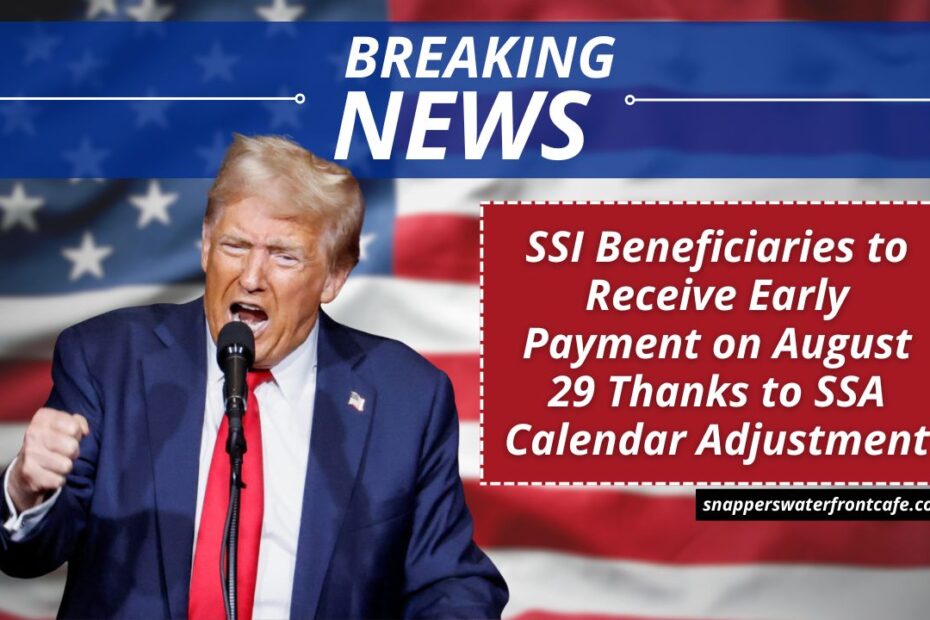In August 2025, recipients of Supplemental Security Income (SSI) will notice two separate payments arriving—one on August 1 and another on August 29.
This might seem like a bonus or even a mistake, but it’s part of the normal schedule adjustment by the Social Security Administration (SSA). Let’s break down what’s happening, what it means for September 2025, and how to stay financially prepared.
Why Are There Two SSI Payments in August 2025?
The occurrence of two SSI deposits in one month may seem like an error or an extra benefit. However, this is due to the SSA’s payment schedule and the upcoming Labor Day holiday.
- Labor Day 2025 falls on Monday, September 1, a federal holiday.
- Since the SSA cannot issue payments on weekends or holidays, the September payment is moved up to Friday, August 29.
- As a result, no SSI payment will be issued in September 2025.
It’s important to note that this does not mean an extra or 13th payment—there are still only 12 monthly payments per year. The funds are simply distributed earlier.
How the SSA Handles Schedule Adjustments
The Social Security Administration has a long-standing policy:
When the first of a month lands on a weekend or federal holiday, SSI benefits are delivered on the last business day of the previous month.
Here’s what’s happening in late 2025 and early 2026:
| Benefit Month | Scheduled Payment Date | Reason for Adjustment |
|---|---|---|
| August 2025 | August 1 | Standard payment |
| September 2025 | August 29 | Sept 1 is Labor Day |
| October 2025 | October 1 | Regular schedule |
| November 2025 | October 31 | Nov 1 is a Saturday |
| January 2026 | December 31, 2025 | Jan 1 is New Year’s Day |
These changes don’t affect your benefit amount—just the date you receive it.
SSI Payment Amounts and 2025 COLA Adjustment
In 2025, a 2.5% Cost-of-Living Adjustment (COLA) has been applied to all federal SSI benefits to help offset inflation. Here are the maximum monthly benefit amounts:
| Recipient Type | Monthly Maximum (2025) |
|---|---|
| Individual | $967 |
| Eligible Couple | $1,450 |
Some states, such as California and New York, provide additional supplemental payments, which may raise the total monthly amount. These state supplements vary and depend on residency and income level.
Eligibility Requirements for SSI in 2025
To qualify for SSI benefits in 2025, individuals must meet specific criteria:
- Monthly earned income must be below $2,019.
- Must be 65 or older, blind, or have a qualifying disability.
- Children with severe medical conditions may also be eligible.
- Assets and resources are also assessed (e.g., bank balances, property).
The SSA performs regular eligibility reviews to ensure recipients still qualify under the program’s rules.
How the August Dual Payment May Affect Other Benefits
Because two payments will land in August, some recipients may temporarily appear to have higher income or account balances. This can affect means-tested programs like:
- SNAP (food assistance)
- Medicaid
- Housing vouchers
The SSA advises beneficiaries to speak with caseworkers or financial counselors and use budgeting tools to plan ahead. Creating separate savings accounts or using a spending schedule can help ensure funds last through September’s payment gap.
Receiving two SSI payments in August 2025 may seem confusing at first, but it’s just a schedule adjustment by the SSA due to the Labor Day holiday. Beneficiaries are not receiving extra income, and no payment will arrive in September.
Planning ahead is essential to maintain financial stability during the gap month. Be proactive by reviewing your budget, tracking expenses, and seeking advice if you’re enrolled in additional aid programs.
FAQs
Why is there no SSI payment in September 2025?
Because September 1, 2025, is Labor Day, the SSA has moved the payment to August 29, which results in no deposit in September.
Will receiving two payments in August increase my yearly benefits?
No, you still receive 12 total payments per year. The second August payment is actually your September benefit, issued early.
Can the early payment affect my Medicaid or SNAP eligibility?
Yes, temporary higher account balances may impact eligibility for income-sensitive programs, so consider consulting a caseworker.



